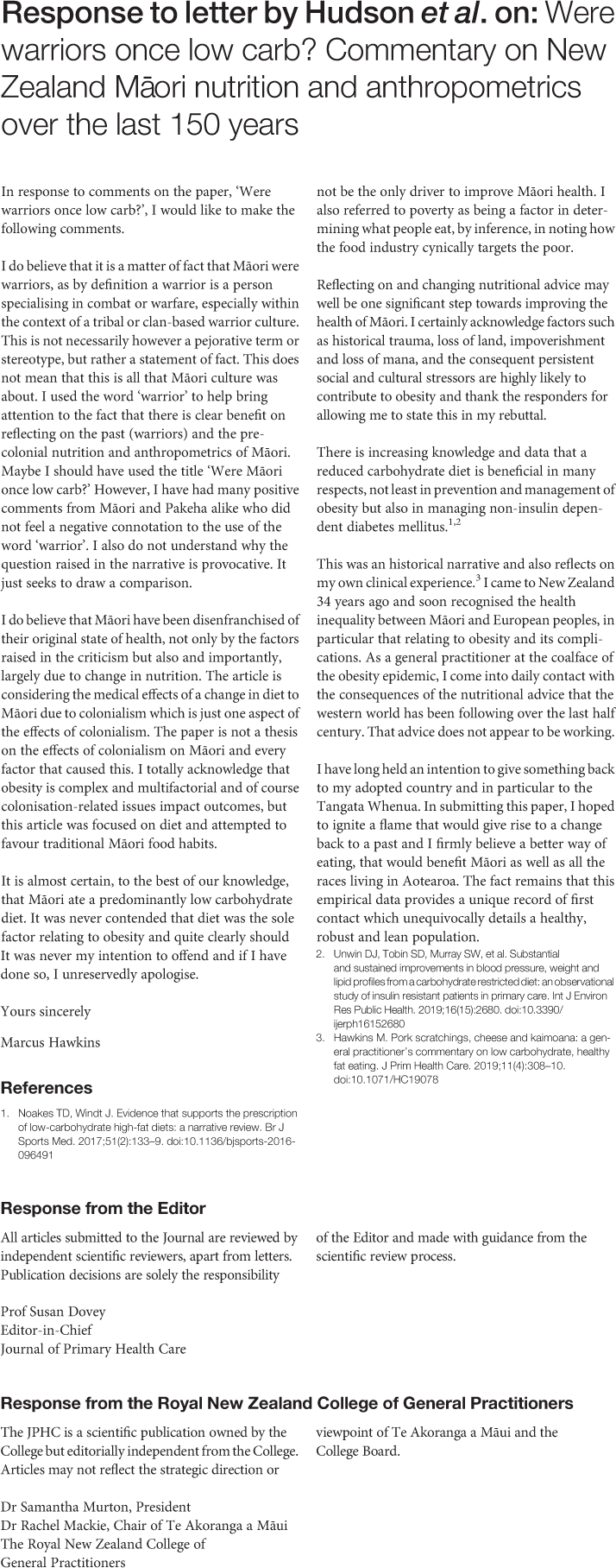A brief response to Hawkins: a call for socially responsive research in Māori health
Ben Hudson 1 , Suzanne Pitama 2 , Lynn McBain 3 , Bridget Robson 4 , Tim Stokes 5 , Jo Baxter 6 , Peter Crampton 61 Department of General Practice, University of Otago Christchurch, New Zealand.
2 Associate Dean Māori, University of Otago Christchurch, New Zealand.
3 Department of Primary Health Care and General Practice, University of Otago Wellington, New Zealand.
4 Associate Dean Māori, University of Otago Wellington, New Zealand.
5 Department of General Practice and Rural Health, Dunedin School of Medicine, New Zealand.
6 Kōhatu, Centre for Hauora Māori, Dunedin School of Medicine, New Zealand.
Journal of Primary Health Care 13(3) 204-206 https://doi.org/10.1071/HC21094
Published: 30 September 2021
Journal Compilation © Royal New Zealand College of General Practitioners 2021 This is an open access article licensed under a Creative Commons Attribution-NonCommercial-NoDerivatives 4.0 International License
We were disappointed to see the pejorative ‘Māori as warrior’ trope revived in a recent article in the Journal.1 In his commentary on Māori nutrition and anthropometrics, Hawkins provocatively asks ‘were warriors once low carb?’ and in so doing immediately brings to mind discredited stereotypes of Māori being congenitally predisposed to violence, a view that was widely criticised in the ‘warrior gene’ controversy over a decade ago.2–5
The choice of title is regrettable enough, but the article itself is also problematic. Hawkins’ argument is that obesity among Māori is due to the post-colonial adoption of a European diet characterised by excessive consumption of carbohydrates, and his proposed solution is to switch to a high fat, low carbohydrate diet, which he contends is closer to the pre-colonisation Māori diet. While there may be value in considering the impact of post-colonisation dietary change, it is highly unlikely that this change in diet is the sole cause of the rise in obesity among Māori. Hawkins is completely silent on any of the other well recognised damaging effects of colonisation on Māori health. Among these, historical trauma, loss of land, impoverishment and loss of mana, and the consequent persistent social and cultural stressors are highly likely to contribute to obesity and other chronic disease among Māori.6,7 Ignoring these potent forces and taking a narrow and simplistic biomedical approach to dietary change is unlikely to be effective in improving health.
The Royal New Zealand College of General Practitioners is rightly committed to achieving health equity for Māori.8 This goal is ill served by the College’s journal re-hashing crude stereotypes and ignoring the wide-ranging adverse effects of colonisation on Māori health, and we call on the Journal to strengthen its approach in this area.
Competing interests
The authors declare no competing interests.
Funding
This research did not receive any funding.
References
[1] Hawkins M. Were warriors once low carb? Commentary on New Zealand Māori nutrition and anthropometrics over the last 150 years. J Prim Health Care. 2021; 13 106–11.| Were warriors once low carb? Commentary on New Zealand Māori nutrition and anthropometrics over the last 150 years.Crossref | GoogleScholarGoogle Scholar |
[2] Lea R, Chambers G. Monoamine oxidase, addiction, and the “warrior” gene hypothesis. N Z Med J. 2007; 120 U2441
| 17339897PubMed |
[3] Hook GR. “Warrior genes” and the disease of being Māori. MAI Review 2009; 2
[4] Merriman T, Cameron V. Risk-taking: behind the warrior gene story. N Z Med J. 2007; 120 U2440
| 17339896PubMed |
[5] Crampton P, Parkin C. Warrior genes and risk-taking science. N Z Med J. 2007; 120 U2439
| 17339895PubMed |
[6] Bell R, Smith C, Hale L, et al. Understanding obesity in the context of an Indigenous population – a qualitative study. Obes Res Clin Pract. 2017; 11 558–66.
| Understanding obesity in the context of an Indigenous population – a qualitative study.Crossref | GoogleScholarGoogle Scholar | 28499848PubMed |
[7] Marks DF. Dyshomeostasis, obesity, addiction and chronic stress. Health Psychol Open. 2016; 3 1–20.
| Dyshomeostasis, obesity, addiction and chronic stress.Crossref | GoogleScholarGoogle Scholar |
[8] Waka HI, Whenua HI, Tangata HI. He Rautaki Māori – Māori strategy. Royal New Zealand College of General Practitioners; 2017.



